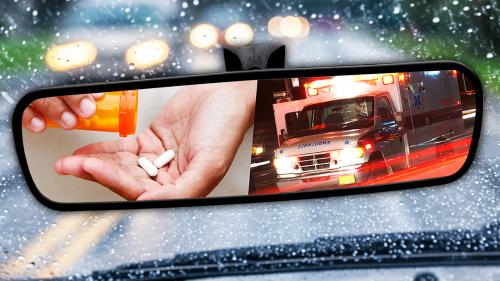Cold Medicines Can When Driving
Some Medicines and Driving Don't Mix
Image

Español
If you're taking a medication, is it safe to drive?
Nearly likely, yep. However, the U.South. Nutrient and Drug Administration (FDA) advises you to make certain before operating whatsoever type of vehicle, whether a auto, double-decker, train, plane, or gunkhole.
Although near medications won't bear on your ability to bulldoze, some prescription and nonprescription medicines (also called over-the-counter, or OTC) can have side furnishings and cause reactions that may make it unsafe to drive. Side effects can include:
- sleepiness/drowsiness
- blurred vision
- dizziness
- slowed motion
- fainting
- inability to focus or pay attending
- nausea
- excitability
Some medicines can affect your driving for a brusque time after you take them. For others, the effects can concluding for several hours, and even the next solar day. And some medicines have a alert to not operate heavy machinery — this includes driving a automobile.
Medicines That Might Affect Driving
Knowing how your medications — or whatsoever combination of them — bear upon your power to drive is a safety measure. Some drugs that could make information technology dangerous to drive include:
- opioid pain relievers
- prescription drugs for anxiety (for case, benzodiazepines)
- anti-seizure drugs (antiepileptic drugs)
- antipsychotic drugs
- some antidepressants
- products containing codeine
- some common cold remedies and allergy products, such as antihistamines (both prescription and OTC)
- sleeping pills
- muscle relaxants
- medicines that treat or control symptoms of diarrhea
- medicines that treat or forestall symptoms of movement sickness
- diet pills, "stay awake" drugs, and other medications with stimulants (east.g., caffeine, ephedrine, pseudoephedrine)
Also, taking cannabidiol (CBD) products and driving can be dangerous. CBD tin can cause sleepiness, sedation, and lethargy. Because of these side effects, consumers should use caution if planning on operating a motor vehicle afterward consuming whatsoever CBD products. For more than data on CBD, visit this FDA page.
Some Sleep Medicines Can Impair You, Even the Next Forenoon
People with insomnia take problem falling or staying asleep. Many take medicines to help slumber. Come morning, though, some sleep medicines could make you lot less able to perform activities for which you must be fully alert, including driving.
A common ingredient in a widely prescribed sleep medication is zolpidem, which belongs to a form of medications chosen allaying-hypnotics. The FDA has found that medicines containing zolpidem, especially extended release forms, can impair driving power and other activities the next morning.
Zolpidem immediate and extended-release forms are marketed equally generic drugs and under these make names:
- Ambien and Ambien CR (oral tablet)
- Edluar (tablet placed under the tongue)
- Intermezzo (tablet placed nether the tongue)
- Zolpimist (oral spray)
People who take sleep medicines should talk to their wellness care professional about ways to take the lowest effective dose. Don't assume that not-prescription sleep medicines are necessarily safer alternatives. The FDA is also evaluating the take chances of side by side-day impairment with other insomnia drugs, both prescription and OTC versions.
Allergy Medicines Can Touch Your Power to Drive
For allergy sufferers, medications containing antihistamines can assistance save many different types of allergies, including hay fever. But these medicines may interfere with driving and operating heavy machinery (including driving a car). Antihistamines tin can slow your reaction fourth dimension, make it difficult to focus or think clearly, and may cause mild confusion even if you don't feel drowsy.
Read the OTC Drug Facts label of your medicine and empathise the warnings earlier using it. Also, avoid drinking alcohol or taking sleep medications while using some antihistamines. Those combinations can increase the sedative effects of antihistamines.
How to Avoid Driving Impaired
You can all the same drive safely while taking nearly medications. Talk to your health care provider nearly possible side effects. For example, some antihistamines and sleep medications work for longer periods than others. You might feel the sedating effects of these medications for some time after you've taken them, and possibly fifty-fifty into the next twenty-four hour period.
Doctors and pharmacists can tell you about known side effects of medications, including those that interfere with driving. You can as well request printed information near the side effects of whatever new medicine.
To manage or minimize side effects while driving, your health care provider may be able to accommodate your dose, suit the timing of when you take the medicine, or change the medicine to one that causes fewer side effects for you lot.
Hither are some more than tips:
- Always follow directions for use and read warnings on medication packaging, or handouts provided by the pharmacy.
- Don't stop using your medicine unless your prescriber tells you to.
- Tell your wellness care provider near all the products you lot are taking, including prescription, OTC, and herbal products. Likewise, permit them know almost any reactions yous experience.
Cold Medicines Can When Driving,
Source: https://www.fda.gov/consumers/consumer-updates/some-medicines-and-driving-dont-mix
Posted by: doryortherce.blogspot.com


0 Response to "Cold Medicines Can When Driving"
Post a Comment